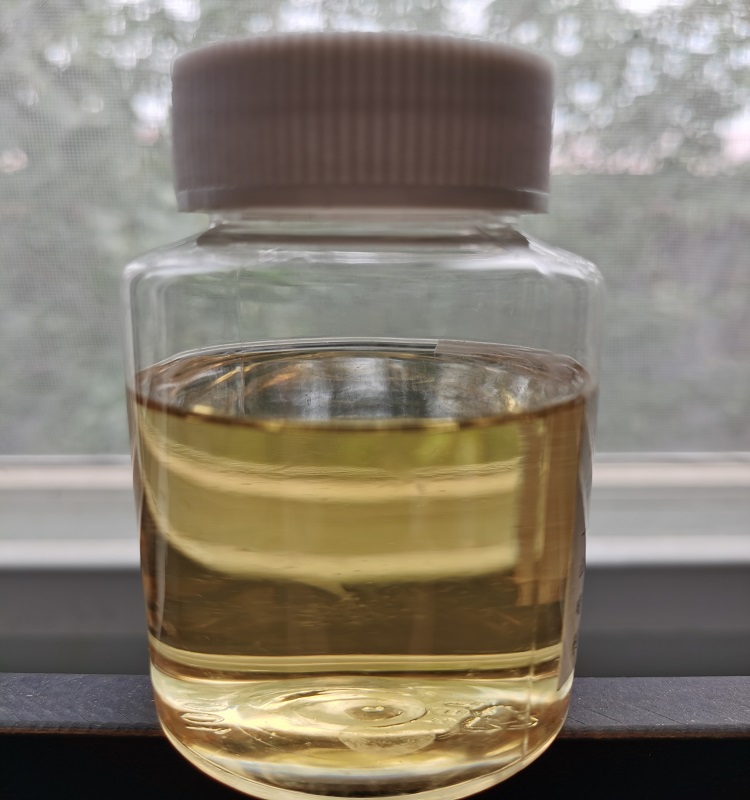Feed additive: Tributyrin
Content: 95%, 90%
Tributyrin as a feed additive to bring improvement in gut health in poultry.
Phasing out of the antibiotics as growth promoters from poultry feed recipes has increased the interest for alternative nutritional strategies, for both increasing poultry performance as well as protecting against pathological disturbances.
Minimizing dysbacteriosis discomfort
In order to keep a check on dysbacteriosis situations, feed additives such as probiotics and prebiotics are being added to influence the production of SCFAs, in particular butyric acid that plays a central role in protecting the intestinal tract integrity. Butyric acid is a naturally occurring SCFA that has many versatile beneficial effects like its anti-inflammatory effect, its influence to speed up the intestinal repair process and stimulating gut villi development. There is a unique way butyric acid acts through a mechanism to prevent infection, namely Host Defense Peptides (HDPs) synthesis, also known as anti-microbial peptides, that are critical components of the innate immunity. They possess broad-spectrum anti-microbial activity against bacteria, fungi, parasites and enveloped viruses which extremely difficult for pathogens to develop resistance against. Defensins (AvBD9 & AvBD14) and Cathelicidins are the two major families of HDPs (Goitsuka et al.; Lynn et al.; Ganz et al.) found in poultry that gets boosted up by butyric acid supplementation. In a study conducted by Sunkara et. al. exogenous administration of butyric acid induces a remarkable increase in HDP gene expression and thus enhances disease resistance ability in chickens. Interestingly, moderate and LCFAs marginal.
Health benefits of Tributyrin
Tributyrin is a precursor of butyric acid that allows more molecules of butyric acid to be delivered into the small intestine directly because of the esterification technic. Thereby, the concentrations are two to three times higher than with conventional coated products. Esterification allows three butyric acid molecules to be bound to glycerol which can only be broken by endogenous pancreatic lipase.
Li et. al. set up an immunological study to find the beneficial effects of tributyrin on pro-inflammatory cytokines in broilers challenged with LPS (lipopolysaccharide). LPS usage is widely recognized to induce inflammation in studies like this since it activates inflammatory markers such as IL (Interleukins). On days 22, 24, and 26 of the trial, broilers were challenged with an intraperitoneal administration of 500 μg/kg BW LPS or saline. Dietary tributyrin supplementation of 500 mg/ kg inhibited the increase of IL-1β & IL-6 suggesting that its supplementation is able to reduce the release of pro-inflammatory cytokines and thus minimize gut inflammation.
Summary
With the restricted use or complete ban on certain antibiotic growth promoters as feed additives, new strategies for improving and protecting the health of farm animals must be explored. Intestinal integrity serves as an important interface between expensive feed raw materials and growth promotion in broilers. Butyric acid in particular is recognized as a potent booster of gastrointestinal health that has already been used in animal feed for more than 20 years. Tributyrindelivers butyric acid in the small intestine and is very effective in impacting intestinal health by speeding up the intestinal repair process, encouraging optimal villi development and modulating the immune reactions in the intestinal tract.
Now with the antibiotic are being phased out, butyric acid is a great tool to support the industry to reduce the negative impact of dysbacteriosis which is surfacing as a result of this change.
Post time: Mar-04-2021






